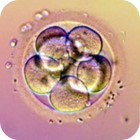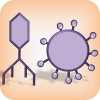Of the couples who have problems getting pregnant, 40% of the time it is the woman who has the problem (30% of the time it is the man and the remaining 30% no reason can be found). This is not surprising as women have the most complicated reproductive organs and carry the developing baby for nine months. The good news is that most of these causes of infertility respond well to fertility treatments.
Below I give an overview of the most common causes of infertility problems in women (and some less common).
If you want to learn more about a specific condition, each overview gives you the opportunity to read a full description. Here you’ll find out how to spot the symptoms and what your next steps are to get treated.
Polycystic Ovarian Syndrome
More simply known as PCOS, this is one of the more common causes of infertility problems in women. Caused by a hormonal imbalance, it affects the development of the egg within the follicles of the ovaries and can result in irregular, infrequent or absent periods. Click here to learn more…
Endometriosis
This is a condition where the normal lining of the uterus is found growing in places other than in the uterus. It can result in very painful periods, pain during sex, and in severe cases, damage to tissues and scarring. Click here to learn more…
Pelvic Inflammatory Disease
This is an inflammation of the delicate reproductive tissues caused by an infection that spreads through the uterus, fallopian tubes and ovaries. Pelvic Inflammatory Disease is a cause of infertility that can result in scar tissue and blockage of the fallopian tubes. Click here to learn more…
Anovulation
Anovulation is a failure of the ovaries that has many different causes, but they all lead to one thing; failure of the ovary to release an egg. If this occurs regularly or all the time, then it will result in fertility problems. Fortunately, most causes of anovulation are treatable. Click here to learn more…
Premature Ovarian Failure
This is a condition where the woman’s ovaries fail to develop and mature eggs and subsequently ovulate before the menopause. Thankfully this is not a common cause of infertility, affecting just 1% of women. Click here to learn more…
Sexually Transmitted Diseases
One of the most common causes of infertility problems in both men and women, these are diseases that are picked up during unprotected sexual activity. Many show no signs or symptoms and some STDs can leave behind causes of infertility even when they have been cured. Click here to learn more…
Surgical Causes of Female Infertility
Surgery that has occurred in the past to any of the organs in the pelvis or to the bowel can cause fertility problems from direct damage to the reproductive organs, or damage resulting from the development of internal scar tissue. Click here to learn more…
Fibroids
Fibroids are non-cancerous growths can develop in the uterus, and if large, can take up significant space leaving less room for fertilised egg implantation and the development of the foetus. This can interfere or prevent implantation of the egg. Click here to learn more…
Diabetes
Diabetes is becoming increasingly common in couples of reproductive age. If it is not controlled, diabetes can result in multiple causes of infertility such as hormonal imbalances that interfere with ovulation and prevent implantation of the egg into the womb lining. Click here to learn more…
Cancer
Survival rates from cancer are rapidly improving, but both cancer itself, if it occurs new the female reproductive organs, and the treatments used to cure it can cause fertility problems even when the cancer itself has been cured. Click here to learn more…
Medicines and Drugs
Certain prescription medications, over the counter medications, and illegal drugs can interfere with a woman’s normal cycle and negatively impact upon her fertility. Do not stop taking any medication you may be taking, but discuss them with your doctor to see if they are the causes of infertility. Click here to learn more…
Infections and Disease
It is not just sexually transmitted diseases that can be the cause of fertility problems for women. Infections and diseases can temporarily reduce fertility or can result in a permanent cause of infertility. Click here to learn more…
Thyroid Problems
Both an overactive and an underactive thyroid gland can upset the normal hormonal balance required for conception and can result in repeated early pregnancy loss. Click here to learn more…
Female Sterilisation
While reversal of sterilisation is technically possible, it does not necessarily result in normal fertility returning. There may be permanent closure of the fallopian tubes, making it impossible for an egg to travel to the uterus after ovulation. Click here to learn more…
Unexplained Infertility
This is where no underlying fertility problem or cause can be found. This can affect up to 30% of couples who are struggling to conceive, but usually responds well to fertility treatments. Click here to learn more…
Links to Popular Related Pages























